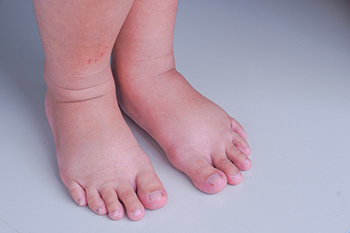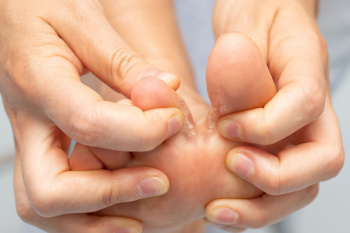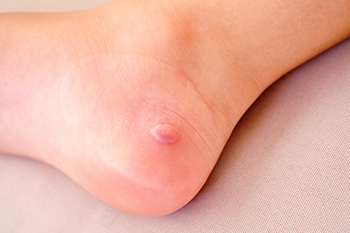Items filtered by date: February 2024
Causes of Foot and Ankle Swelling

Foot and ankle swelling, medically known as peripheral edema, can be a distressing symptom with various underlying causes. One common reason for swelling is fluid retention, which can occur due to prolonged standing or sitting, especially in hot weather. Another culprit is injury or trauma to the foot or ankle, leading to inflammation and fluid accumulation in the affected area. Medical conditions such as venous insufficiency, deep vein thrombosis, or lymphatic obstruction can also result in swelling. Furthermore, heart failure, kidney disease, liver disease, and certain medications can contribute to fluid retention and subsequent swelling in the lower extremities. Hormonal changes during pregnancy or menstruation may cause temporary swelling. Lifestyle factors, like excessive salt intake, poor diet, obesity, and lack of physical activity, can cause swelling. Identifying the underlying cause of foot and ankle swelling is essential for effective management and prevention of complications. If your feet or ankles are swollen, it is suggested that you consult a podiatrist who can determine the cause and offer appropriate relief and treatment solutions.
Swollen feet can be a sign of an underlying condition. If you have any concerns, contact one our our podiatrists of Newtown Comprehensive Foot Care. Our doctors can provide the care you need to keep you pain-free and on your feet.
Swollen feet are a common ailment among pregnant women and people who stand or sit for extended periods. Aging may increase the possibility of swollen feet and patients who are obese often notice when their feet are swelling too. There may be medical reasons why swollen feet occur:
- Phlebitis - A condition that causes the veins to become inflamed and can also cause leg pain.
- Liver disease - This may lead to low blood levels of albumin which is a protein. This can cause fluid in the blood to pass into the tissues and several areas of the body can become swollen.
- Heart failure - When the heart doesn’t pump properly the blood that is normally pumped back to the heart can pool in the veins of the legs causing swollen feet.
- Kidney disease - One of the main functions of the kidneys is releasing excess fluid in the body. This type of condition can make it difficult for the kidneys to function properly, and as a result the feet may become swollen.
- Deep-vein thrombosis (DVT)- This is a serious condition where blood clots form in the veins of the legs. They can block the return of blood from the legs to the heart which may cause the feet to swell. It is important to be treated by a podiatrist if this condition is present.
Swollen feet can also be caused by bone and tendon conditions, including fractures, arthritis, and tendinitis. Additionally, there may be skin and toenail conditions and an infection may cause the feet to swell. Patients who take medicine to treat high blood pressure may be prone to getting swollen feet.
Many patients elevate their feet to help relieve the swelling and this is generally a temporary remedy. When a podiatrist is consulted the reason behind the swelling can be uncovered and subsequently treated.
If you have any questions please feel free to contact our office located in Newtown, CT . We offer the newest diagnostic tools and technology to treat your foot and ankle needs.
Why Live with Pain and Numbness in Your Feet?
Arch Issues in Pregnancy

The impact of pregnancy on changes in the foot arch is a topic of study. Arch collapse, more common in females, especially during pregnancy, may lead to various foot issues, potentially necessitating surgeries. Hormonal fluctuations, including increased levels of relaxin, progesterone, and estradiol, can contribute to ligament laxity, potentially affecting the foot arch. Research suggests a correlation between pregnancy and foot volume increase, though not necessarily shoe size. If you are pregnant and feel pain in the arches or your feet, it is suggested that you schedule an appointment with a podiatrist who can get to the root of the problem and offer effective relief options.
Pregnant women with swollen feet can be treated with a variety of different methods that are readily available. For more information about other cures for swollen feet during pregnancy, consult with one our our podiatrists from Newtown Comprehensive Foot Care. Our doctors will attend to all of your foot and ankle needs.
What Foot Problems Can Arise During Pregnancy?
One problem that can occur is overpronation, which occurs when the arch of the foot flattens and tends to roll inward. This can cause pain and discomfort in your heels while you’re walking or even just standing up, trying to support your baby.
Another problem is edema, or swelling in the extremities. This often affects the feet during pregnancy but tends to occur in the later stages.
How Can I Keep My Feet Healthy During Pregnancy?
- Wearing orthotics can provide extra support for the feet and help distribute weight evenly
- Minimize the amount of time spent walking barefoot
- Wear shoes with good arch support
- Wear shoes that allow for good circulation to the feet
- Elevate feet if you experience swelling
- Massage your feet
- Get regular, light exercise, such as walking, to promote blood circulation to the feet
If you have any questions please feel free to contact our office located in Newtown, CT . We offer the newest diagnostic and treatment technologies for all your foot and ankle needs.
What Are the Causes and Symptoms of Athlete’s Foot?

Athlete's foot, a common fungal infection, affects the skin of the feet and thrives in warm, damp environments such as sweaty socks and communal showers. The primary cause is the fungus trichophyton, which spreads through direct contact with contaminated surfaces or through contact with infected individuals. The signs and symptoms of athlete's foot vary, but often include itching, burning sensations, and redness between the toes or on the soles of the feet. In some cases, blisters or cracked skin may develop, leading to discomfort and pain. If left untreated, athlete's foot can spread to other areas of the body and cause secondary infections. Proper hygiene practices, such as keeping the feet clean and dry, wearing breathable footwear, and avoiding walking barefoot in public areas, may help to prevent athlete's foot. Early recognition and management are key to resolving athlete's foot and preventing its recurrence. If you have any of the above symptoms, it is strongly suggested that you visit a podiatrist as quickly as possible who can provide you with the necessary medication for relief and treatment.
Athlete’s foot is an inconvenient condition that can be easily reduced with the proper treatment. If you have any concerns about your feet and ankles, contact one our our podiatrists from Newtown Comprehensive Foot Care. Our doctors will treat your foot and ankle needs.
Athlete’s Foot: The Sole Story
Athlete's foot, also known as tinea pedis, can be an extremely contagious foot infection. It is commonly contracted in public changing areas and bathrooms, dormitory style living quarters, around locker rooms and public swimming pools, or anywhere your feet often come into contact with other people.
Solutions to Combat Athlete’s Foot
- Hydrate your feet by using lotion
- Exfoliate
- Buff off nails
- Use of anti-fungal products
- Examine your feet and visit your doctor if any suspicious blisters or cuts develop
Athlete’s foot can cause many irritating symptoms such as dry and flaking skin, itching, and redness. Some more severe symptoms can include bleeding and cracked skin, intense itching and burning, and even pain when walking. In the worst cases, Athlete’s foot can cause blistering as well. Speak to your podiatrist for a better understanding of the different causes of Athlete’s foot, as well as help in determining which treatment options are best for you.
If you have any questions please feel free to contact our office located in Newtown, CT . We offer the newest diagnostic and treatment technologies for all your foot and ankle needs.
The Origins of Foot Blisters

Foot blisters are pockets of fluid that can disrupt our stride, and arise from a multitude of sources, often interconnected. Friction, a primary culprit, occurs when shoes rub against the skin, creating heat and pressure that lead to the formation of blisters. Ill-fitting footwear, especially those that are too tight or too loose, exacerbates this friction. Moisture is another contributing factor, as damp conditions soften the skin, making it more susceptible to friction-related injuries. Prolonged periods of standing or walking intensify these forces, increasing the likelihood of blister formation. Foot deformities or irregularities, such as bunions or hammertoes, can also contribute by causing uneven pressure distribution. It is helpful to know the reason a blister has formed on your foot. If you have one or multiple foot blisters, it is suggested that you confer with a podiatrist who can guide you toward effective prevention methods.
Blisters may appear as a single bubble or in a cluster. They can cause a lot of pain and may be filled with pus, blood, or watery serum. If your feet are hurting, contact one our our podiatrists of Newtown Comprehensive Foot Care. Our doctors can provide the care you need to keep you pain-free and on your feet.
Foot Blisters
Foot blisters are often the result of friction. This happens due to the constant rubbing from shoes, which can lead to pain.
What Are Foot Blisters?
A foot blister is a small fluid-filled pocket that forms on the upper-most layer of the skin. Blisters are filled with clear fluid and can lead to blood drainage or pus if the area becomes infected.
Symptoms
(Blister symptoms may vary depending on what is causing them)
- Bubble of skin filled with fluid
- Redness
- Moderate to severe pain
- Itching
Prevention & Treatment
In order to prevent blisters, you should be sure to wear comfortable shoes with socks that cushion your feet and absorb sweat. Breaking a blister open may increase your chances of developing an infection. However, if your blister breaks, you should wash the area with soap and water immediately and then apply a bandage to the affected area. If your blisters cause severe pain it is important that you call your podiatrist right away.
If you have any questions, please feel free to contact our office located in Newtown, CT . We offer the newest diagnostic and treatment technologies for all your foot care needs.

